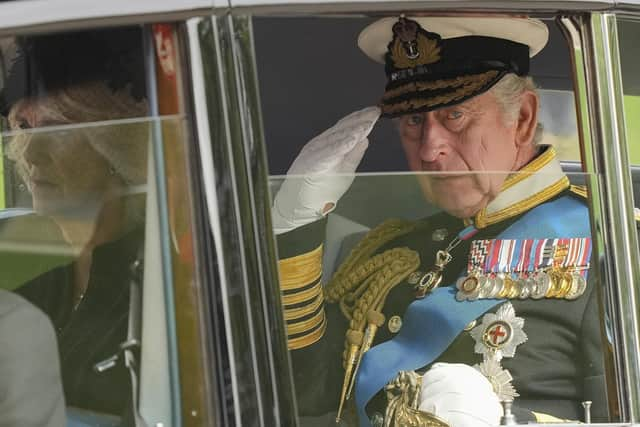Can the King dissolve Parliament? Royal powers explained - could Charles dismiss Liz Truss as Prime Minister
and live on Freeview channel 276
King Charles III is the latest monarch of the United Kingdom and with that title comes a range of responsibility and powers.
He is the head of state for the country, assuming the role following the death of Queen Elizabeth II in September 2022. The King also has ceremonial responsibilities when it comes to the opening and closing of Parliament.
Advertisement
Hide AdAdvertisement
Hide AdThe Prime Minister Liz Truss is under pressure following a calamitous 24 hours for her premiership. Her home secretary Suella Braverman resigned following a “security breach”. Her departure, just five days after Kwasi Kwarteng’s sacking as chancellor, means the Ms Truss has lost two people from the four great offices of state within her first six weeks in No 10.
Confusion over a vote on an opposition day motion led to ugly scenes with Cabinet ministers Therese Coffey and Jacob Rees-Mogg among a group of senior Tories accused of pressuring colleagues to go into the “no” lobby, with Labour former minister Chris Bryant saying some MPs were “physically manhandled into another lobby and being bullied”.
The number of Conservatives publicly calling for the Prime Minister to quit doubled to a dozen within the space of a couple of hours on Thursday (20 October) morning. It has led to some people online wondering if the King could act following the scenes of chaos.
But does the monarch have the power to dissolve Parliament or even sack a Prime Minister? Here is all you need to know:
What powers does the King have in the UK?
Advertisement
Hide AdAdvertisement
Hide AdThe monarch of the United Kingdom has powers known as the royal prerogative. It is a body of customary authority, privilege, and immunity.
In the past, the prerogative powers were used by the monarch acting on his or her own initiative, however since the 19th century these are largely ceremonial. The advice of the Prime Minister or cCbinet has been required in order for the powers to be exercised. The PM and Cabinet are accountable to Parliament.
Among the prerogative powers includes Royal Ascent, in which laws are formally approved by the monarch.


Can the King dissolve Parliament?
The UK is a constitutional monarchy, meaning that the head of state is the King and not an elected figure like the President of the United States of America. However the governing of the country is run by the elected MPs in the House of Parliament.
Advertisement
Hide AdAdvertisement
Hide AdIn his role as the head of state, King Charles has certain powers over Parliament. The monarch is the one who dissolves Parliament at the end of its term. When this happens all MPs are dismissed and a general election is called. Parliament is dismissed 25 days before a general election.
Historically terms of Parliament lasted for five years, before a general election is needed. The Dissolution and Calling of Parliament Act 2022 replaced the Fixed-term Parliament Act and reintroduced powers for a government to call a snap election.
The monarch must give their permission for Parliament to be dissolved but also has the powers to refuse requests for a dissolution, in certain situations. A Prime Minister has to go to the Palace and ask for the King’s permission to dissolve Parliament.
Historically the monarch could force the dissolution of Parliament by refusing royal ascent, but by convention bills are always assented. The last time royal ascent was not granted to a bill was in 1708.
Advertisement
Hide AdAdvertisement
Hide AdIn theory the King has the powers to dissolve Parliament, but will only do so at the request of a Prime Minister in advance of a general election.
Can the King reject request to dissolve Parliament?
The monarch can refuse a Prime Minister’s request to dissolve Parliament under the Lascelles Principle. It is a constitutional convention which was introduced in the 1950s.
Under the principle, the sovereign can reject a dissolvement:
- if the existing Parliament is still “vital, viable, and capable of doing its job”,
- if a general election would be “detrimental to the national economy”, and
- if the sovereign could “rely on finding another prime minister who could govern for a reasonable period with a working majority in the House of Commons”
Can the King sack a Prime Minister?
Liz Truss remains under severe pressure after 24 hours of chaos, in which she lost her home secretary and a vote in Parliament sparked claims of MPs being “manhandled”. It comes in the wake of the fallout from September’s mini-budget, which Ms Truss has been forced to U-turn on - leaving only a couple of policies remaining.
Advertisement
Hide AdAdvertisement
Hide AdThe Prime Minister is officially appointed by the monarch. The leader of the party best placed to command a majority in the House of Commons is appointed to the role of PM.
Technically the King has the powers to remove a Prime Minister, but is extremely unlikely to use them. The sovereign has to remain politically neutral.
The last time a PM was dismissed by a monarch was Lord Melbourne in 1834, who was the leader of the Whig administration at the time. He was dismissed by King George IV.
Comment Guidelines
National World encourages reader discussion on our stories. User feedback, insights and back-and-forth exchanges add a rich layer of context to reporting. Please review our Community Guidelines before commenting.